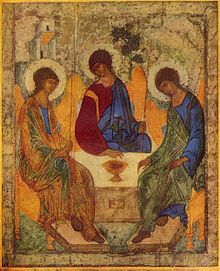Whit Monday

Whit Monday or Pentecost Monday (also known as Monday of the Holy Spirit) is the holiday celebrated the day after Pentecost, a movable feast in the Christian calendar. It is movable because it is determined by the date of Easter.
Whit Monday gets its English name for following "Whitsun", the day that became one of the three baptismal seasons. The name "Whitsunday" is now generally attributed to the white garments formerly worn by the candidates for baptism on this feast.
Observance in European countries
Until recently, Whit Monday was a public holiday in Ireland. It was a bank holiday in the United Kingdom until 1967. It was formally replaced by the fixed Spring Bank Holiday on the last Monday in May in 1971[1]. It was also a public holiday in various former British colonies, especially in the Pacific. It is still a public holiday in some of the countries of the Commonwealth Caribbean.
The Monday after Pentecost is also a holiday in Austria, Belgium, Cyprus, France, Germany, Greece, Hungary, Luxembourg, The Netherlands, Switzerland, and several Scandinavian countries. In many of these countries, Whit Monday is known as "the second day of Pentecost" or "the second Whitsun". In France, it was a non-pay work day for many workers from 2005 to 2007. This was to raise extra funds for elderly and disabled people [2]. It became a public holiday again in 2008 [3]. In Liechtenstein, Whit Monday is considered to be a "favorite holiday"; much like Christmas in many other countries. In Germany, Whit Monday (German: Pfingstmontag) is a Holy Day of Obligation for Roman Catholics.[4]
Observance in Eastern Orthodoxy
In the Eastern Orthodox Church Whit Monday is known as "Monday of the Holy Spirit" or "Day of the Holy Spirit" and is the first day of the afterfeast of Pentecost, being dedicated specifically to the honor of God the Holy Spirit. The day following is known as Third Day of the Trinity. In the services on the Monday of the Holy Spirit many of the same hymns are sung as on the day of Pentecost itself. During the Divine Liturgy the Deacon intones the same introit as on the day of Pentecost, and the dismissal is the same as on the day of Pentecost. Special canons to the Holy Spirit are chanted at Compline and Matins.
Dates
| Year | Western | Eastern |
|---|---|---|
| 2002 | May 20 | June 24 |
| 2003 | June 9 | June 16 |
| 2004 | May 31 | |
| 2005 | May 16 | June 20 |
| 2006 | June 5 | June 12 |
| 2007 | May 28 | |
| 2008 | May 12 | June 16 |
| 2009 | June 1 | June 8 |
| 2010 | May 24 | |
| 2011 | June 13 | |
| 2012 | May 28 | June 4 |
| 2013 | May 20 | June 24 |
| 2014 | June 9 | |
| 2015 | May 25 | June 1 |
| 2016 | May 16 | June 20 |
| 2017 | June 5 | |
| 2018 | May 21 | May 28 |
| 2019 | June 10 | June 17 |
| 2020 | June 1 | June 8 |
In 2007, Whit Monday was observed on May 28, which coincided with the United States' holiday, Memorial Day.
The table on the right provides columns giving the dates on which Whit Monday is observed in both Western Christianity and Eastern Christianity. The Eastern Orthodox and Oriental Orthodox churches calculate Pascha (Easter) differently from the West (see Computus), and so the date of Whit Monday will be different most years.
References
- ^ Spring Bank Holiday in the United Kingdom. Retrieved 2009-04-17.
- ^ Solidarity Day in France Retrieved 2009-04-17.
- ^ Whit Monday in France. Retrieved 2009-04-17.
- ^ Deutsche Bischofskonferenz, 1995-10-05, Feiertagregelung. Retrieved 2008-05-12.
